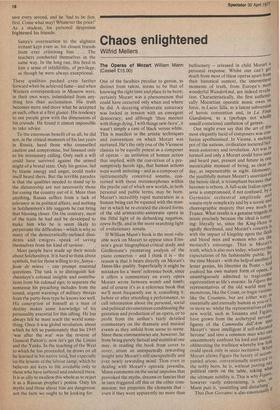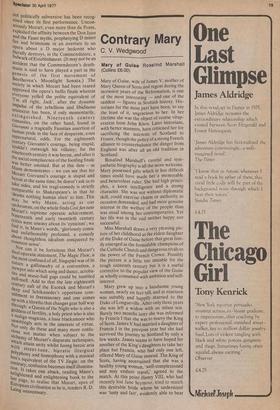Chaos enlightened
Wilfrid Mellers
The Operas of Mozart William Mann (Cassell E15.00)
One of the faculties peculiar to genius, as distinct from talent, seems to be that of knowing the right time and place to be born; certainly Mozart was a phenomenon that could have occurred only when and where he did. A decaying aristocratic autocracy was locked in tension with an emergent democracy; and although 'thou meetest with things dying, I with things new-born', it wasn't simply a case of black versus white. This is manifest in the artistic techniques and Conventions on which Mozart was nurtured. He's the only one of the Viennese classics to be equally potent as a composer of operas — an imitation of human action that implied, with the conviction of a presumptively heroic age, that human actions were worth imitating— and as a composer of instrumentally conceived sonatas, concerned with those metamorphoses within the psyche out of which new worlds, in both personal and public terms, may be born. Mozart's incredibly rapid maturation as a human being can be equated with the manner in which he re-created the closed forms of the old aristocratic-autocratic opera in the fitful light of its debunking negation, opera buffa, and in the more searching light of evolutionary sonata.
If William Mann's book is the most valuable work on Mozart to appear since Einstein's great biographical-critical study and Girdlestone's pioneering analysis of the piano concertos — and I think it is — the reason is that it bears directly on Mozart's Janus-like quality. Superficially it might be mistaken for a 'mere' reference book, since it offers a commentary on every opera Mozart wrote between womb and tomb; and of course it's as a reference book that we'll most frequently use it, consulting it, before or after attending a performance, to cull information about the personal, social and political circumstances conditioning the gestation and production of an opera, or to profit from the author's fairly detailed commentary on the dramatic and musical events as they unfold from scene to scene. Since these commentaries are, however, far from being purely factual and statistical one may, in reading the book from cover to cover, attain an unexpectedly rewarding insight into Mozart's still unexpectedly and ever newly rewarding mind. Thus even in dealing with Mozart's operatic juvenilia, Mann comments on the social impulses that provoked the myths, dreams or fancies that in turn triggered off this or the other commission: but pinpoints the elements that — even if they were apparently no more than
buffoonery — released in child Mozart a personal response. Whilst one can't get much from most of these operas apart froin their historical context, the intermittent moments of truth, from Europe's most wonderful Wunderkind, are indeed revelation. Characteristically, the first authentically Mozartian operatic music owes its force, in Lucio Silla, to a latent subversion of heroic convention and, in La Finta Giardinfera, to a (perhaps not whollY unself-conscious) confusion of genres. One might even say that the art of this most elegantly lucid of composers was confusion apotheosised. In Vienna, a melting pot of the nations, civilisation teetered between autocracy and revolution. Art was in turmoil and only a Mozart could have seen and heard past, present and future in one inextricable moment of being, as clear as day, as impenetrable as night. Idomeneo, the youthfully mature Mozart's assertion of the heroic ideal, is triumphant because that heroism is reborn. .A full-scale Italian opera seria is compromised, if not confused, 11 a Germanic orchestral amplitude and sonata-style complexity and by a scenic and choreographic majesty that owe much to France. What results is a genuine tragedy music precisely because the ideal is tottering: literally so, since the King-Hero j5 agedly moribund, and Mozart's concern is with the impact of kingship upon the flesh and blood men and women who are the monarch's entourage. That is Mozart's truth, which is also ours today, whatever the expectations of his fashionable public. 13X. the time Mozart — with the help of another it lesser genius, his librettist da Foote — tla,d: evolved his own mature form of opera, 11 unambiguously admitted to tragi-conlie equivocation as life's essence. In Fikaro the representatives of the old world may be monstrous, like the Count, or tragic victinis, like the Countess, but are either way aS essentially and eternally human as you or 1, or more so: whilst the representatives of the new world, such as Susanna and Figar°' have grown from the archetypal servant" figures of the Commedia dell'Arte int° Mozart's 'most intelligent if self-educated heroine' and into a common man who ea° uncommonly confront his lord and !pastel:: obliterating the tradition whereby low foil' could speak only in secco recitative. When Mozart allows Figaro the luxury of accoinpanied arioso. conventionally restricted t° the nobly born, he is, without putting anY political cards on the table, asking what the ultimate nobility is. This is why Figar°: however vastly entertaining, is also, Mann puts it, 'unsettling and disturbing That Don Giovanni is also emotionallYu not politically subversive has been recognised since its first performance. Unconsciously Mozart, even more than da Ponte, exploited the affinity between the Don Juan and the Faust myths, prophesying D minor fire and brimstone in an overture to an opera about a D major hedonist who literally destroys, in the Commendatore, a bulwark of Establishment. (It may not be an accident that the Commendatore's death Music is said to have played a part in the genesis of the first movement of beethoven's Moonlight Sonata.) The society in which Mozart had been reared approved the opera's buffo finale wherein everyone yelled the polite equivalent of all right, Jack', after the dynamic impulse of the rebellious and libidinous aristocrat has been, if only momentarily, extinguished. Nineteenth century romantics, on the other hand, found in Giovanni a tragically Faustian assertion of human pride in the face of desperate, even supernatural, odds. For the eighteenth century Giovanni's courage, being stupid, couldn't outweigh his villainy; for the nineteenth centUry it was heroic, and after it the social complacence of the footling finale Was better omitted. But at this date – as Mann demonstrates – we can see that for Mozart Giovanni's courage is stupid and heroic at the same time; he doesn't ask us to take sides, and his tragi-comedy is strictly comparable to Shakespeare's in that he 'deems nothing human alien' to him. This may be why Mann, acting as our sPokesman, on the whole finds Cosi fan tutte Nineteenth supreme operatic achievement. odneteenth and early twentieth century c_ritics were uneasy about its `cynicism'; we find it, in Mann's words, 'gloriously comic and unfathomably profound, a comedy about thoughtless idealism conquered by common sense'. Nor can it be fortuitous that Mozart's
final .
Operatic statement, The Magic Flute, is the most confused of all. Singspiel was of its nature a gallimaufry of a convention, a tewpot into which song and dance, acrobatics and music-hall gags could be tumbled Pell-mell. Add to that the late eighteenth century cult of the Exotick and Mozart's °eel:, and Schikaneder's opportune commitment to freemasonry and one comes Up with a libretto that changes gear half way through: a Queen of the Night who is also a goddess of fertility, a holy priest who is also a malign magician, a base blackamoor who u_nwittingly acts in the interests of virtue. ..IN.ot only do these and many more confu'arils not matter when subject to the cl.lemy of Mozart's disparate techniques, Which attain unity whilst fusing heroic aria With street-tune, hieratic liturgical 13°1Yphony and homophony with a musical box's equivalent of the TV Jingle: on the contrary, confusion becomes itself illumination. It takes one aback, reading Mann's nlightened and enlightening book to the i;st Page, to realise that Mozart, apex of uropean civilisation as he is, renders R. D. Laing unnecessary.



































 Previous page
Previous page